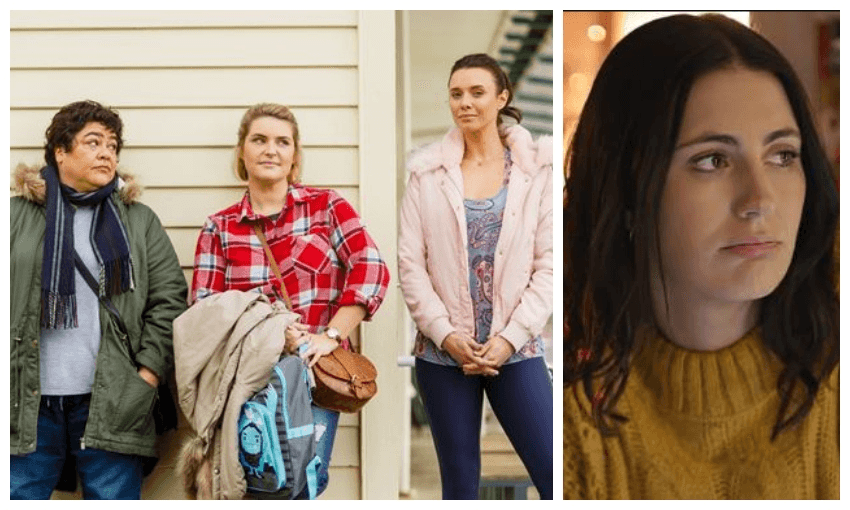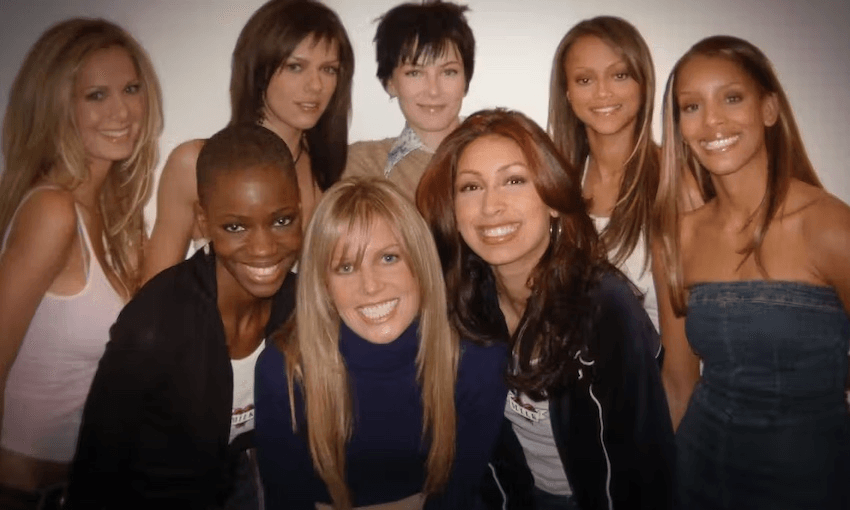Three’s Pilot Week is done – but how good were the pilots, and which ones should get commissioned? Sam Brooks reviews.
It’s been a wild week, y’all. I can’t remember the last time we had two and a half hours of new New Zealand comedy content for an entire week on our screens. (Probably the first episode of Dancing with the Stars NZ, but I digress.)
I’ve now watched all the pilot episodes, and I have some reckons.
If you disagree with me, please have your say on social media, that’s the whole point of this thing! This is just my opinion, the opinion of someone who has heralded the brilliance of Absolutely Fabulous, the competence of Family Guy and written several thousand words about the aforementioned Dancing with the Stars NZ. So what do I know, go hashtag your chosen show on social media, go to Three’s Facebook page. Go wild, fam! It’s your say that matters.
Without further ado, my reviews of the five pilots, ranked from worst to best.
5. Sidelines
There’s a version of Sidelines that works. It’s a strong foundation for a show, after all: Three dudes (and one woman) are stuck together every weekend because their kids play soccer/football (choose whichever your pedantry aligns you with). You’ve got a built-in structure, you’ve got built-in low real world stakes but high emotional stakes, and near endless possibilities for conflict.
This Sidelines is not that show. Its style is one that was dry ten years ago, and is now straight up stale and mouldering at the edges: the According to Jim sensibility in which a crotchety, heavily-flawed guy with a hot wife is recipe enough for comedy. Nick Rado, Tarun Mohanbhai and Cohen Holloway play the three dudes, and while it’s clear that they’re pitched as irascible but lovable, all three come off as creepy and intolerable. Holloway’s character sleeps with the mum of one of his team’s kids to guarantee his spot on the team; Mohanbhai’s preys on younger women at bars. While it’s clear Rado’s character is meant to be the lovable one, he comes off as one dimensional and dull. One bright spot is Donna Brookbanks, who does good work as a highly religious South African mum. Even though most of the jokes she’s given rely on her accent, she’s memorable enough to make her character stick.
It doesn’t help that the women are all visibly, awkwardly younger than their male counterparts. While not an offensive trope in itself, it’s a shame that we’re still seeing it in 2018 – and it’s representative of just how old-school Sidelines is. It’s employing a style that is familiar from traditional three-camera sitcoms while also trying to be lo-fi and current, and it just doesn’t work.
Should it be commissioned? There’s definitely an audience for this show, but unfortunately for Sidelines it existed a decade ago, if not before.
4. Mangere Vice
If you’re making a comedy about cops in 2018, you’ve a difficult line to tread: Do you go full parody and make fun of the system? Or do you err on the side of warmth and sweetness, and risk creating a puff piece for that problematic system? It’s a line that Brooklyn Nine-Nine has carefully, and not always successfully, trod for six seasons.
Mangere Vice seems to lean more towards the former style than the latter, going for easy laughs over satire. There are fart jokes, and there are long improv-y riffs on Epsom-raised Detective Povi Va’a’s fish out of water status. All of which leads to the feeling that this could have been set in any workplace – the police setting feels fairly incidental, as does the Mangere location
The strength of Mangere Vice is its cast, particular Iaheto Ah Hi as Povi Va’a. He sells two dollar jokes and gags like they’re fifty dollar ones, and he makes the idea of a first-day detective who is ludicrously incompetent actually believable and funny. Rachel House, giving a Andre Braugher-esque deadpan performance as the police chief, and Ana Scotney, nailing every line she’s given as actually-competent cop Beatrice, make this show worth commissioning on their strength alone.
There’s more than a little of Brooklyn Nine-Nine’s DNA in Mangere Vice – inevitably given the setting – but it could stand to take a little more of that show’s DNA. There’s a lot of potential in the premise – as difficult as it is to make politically sound comedy about cops, there’s still plenty of ways to make policing funny – but tighter pacing, tighter jokes (and, frankly, fresher jokes) would allow it to fulfil its promise.
Should it be commissioned? This show has potential in some form, but I don’t think it’s quite there yet – especially when judged against the other pilots.
3. The Lonely Hearts Motel
The Lonely Hearts Motel throws you right into the action without any set-up: We’re in a shitty motel room in a small town. People are complaining. The proprietors, played by Millen Baird and Ginette McDonald, are genuinely bizarre people. Another proprietor, a recent arrival played by Toby Sharpe, is trying to fix it.
The Lonely Hearts Motel is an odd duck; its absurdist tone fits strangely into the half hour format. Scenes feel more like sketches, and the entire pilot episode seems patched together from these disparate parts. Still, there’s a consistency and a genuine, if twisted, heart to the absurdism that sets it apart from the rest of the pilots: probably the most touching moment of all five episodes was Millen Baird interacting with his clearly gay son on the phone. If Lonely Heart Club maintains that heart, it’ll be a winner.
Also, anything that gets Ginette McDonald back on our screens regularly can’t be a bad thing.
Should it be commissioned? My love for McDonald aside, Lonely Heart Club has a lot of heart and could survive as a TV series. But I think it’d really thrive as web content, where there’s more room to play with length and tone.
2. Golden Boy
Speaking of New Zealand television treasures – Hayley Sproull is a goddamned star. Give her everything. She roars into the Golden Boy pilot as Mitch, a brilliant-but-maybe-not-as-brilliant-as-she-thinks-she-is journalist who has been relegated back to her small town. She gives a layered, spiky and full performance from the first scene.
Golden Boy comes into Pilot Week as the heavy hitter. It’s the one that seems to have had the most pre-transmission press, it comes out of the new generation of TV writers (Alice Snedden, Nic Sampson, Eli Matthewson and Please Like Me’s Tom Ward are credited), and it has a more clear, millennial-and-under bent than the other shows. And for the most part, it fulfils that promise.
It’s notably the best-looking of the pilots too. The visual style does a great job of evoking the claustrophobia of life in a small town, and the faded browns of sports bars and old furniture do the lion’s share of the work of making the town of Crawdon feel like a dead-end place for Mitch. The tone whiplashes a lot in the space of 22 minutes, and it often feels like it is trying to tick off more boxes than it can do consistently – there’s a little bit of sketch comedy, a little bit of mean-spirited small town satire, a little bit of art-house dramedy – but the performances, particularly Sproull’s, tie it all together into a solid package.
Golden Boy also does a good job of setting up a hook for the rest of the season: What is actually going on with Mitch’s All Black brother Tama (played in essentially a cameo role by James Rolleston), and what is Mitch going to have to do to cover up for him and not go crazy at the same time? It’s a compelling question, and one that I genuinely want to see play out.
Should it be commissioned? Yes. Absolutely. We don’t make enough shows like this.
1. Mean Mums
This is it. This is your winner, brothers and sisters and other siblings.
If Golden Boy is the HBO show of Pilot Week, then Mean Mums is the NBC show of Pilot Week. That sounds like shade, but I remind you that NBC is the network that gave us 30 Rock, The Good Place, Parks and Recreation, Friends, Community, Will and Grace and a huge list of the other best sitcoms ever made. They do brilliant, well-produced, crowd-pleasing comedy.
Mean Mums wouldn’t feel out of place on NBC either. The premise is ready-made to be a long-running sitcom: Jess has moved to a new suburb with her son, Ryan, and it’s his first day at his fancy new school which has an incredibly rigid series of unspoken social rules and administrative oddities. Almost immediately, she finds herself butting up against the regime.
As Jess, Morgana O’Reilly brings a very Kristen Bell-like charisma to the lead role. She’s incredibly likeable, balancing her character’s earnestness with her refusal to take shit in a way that is human and complex. She’s helped out by Amanda Allison’s writing, which even in the first 22 minutes sets Jess up as a real human being, not a joke machine or a series of tropes.
As a performer, O’Reilly is a perfect choice to hang the show on. She has such winning charisma that even when she’s making fun of somebody, you feel like you’re on her side, and immediately against whoever she’s making fun of. What’s more, she has the skills to embody Jess’ big emotional moments; when Jess is genuinely concerned about her son Ryan being moved to a difficult class, you feel it.
The cast also includes Anna Julienne as alpha-mum Heather and Aroha Rawson as the lovingly chill Hine, and both actors get chances to play comedy and heart. There are shades of Jane Krakowski’s aloof deadpan in Julienne’s performance, and Rawson in particular gets to quietly take the piss out of the fairly low stakes of the situation. Both characters are, crucially, not just sidekicks but well-rounded in their own right.
Almost uniquely among the five, Mean Mums nails the tone, perfectly balancing heart and humour. There’s a wackiness to the pilot that feels uniquely American sitcommy, so it’s a credit to both the performers and Allison’s writing that it doesn’t feel like a bad cover of a good song. Instead, it feels lived in, the jokes reading as specific and thoughtful. Even as someone who is familiar with the contemporary education system only through my colleagues and their children, I could tell Mean Mums came from an authentic place.
And, most crucially, Mean Mums is smart enough to know the world it’s making fun of while never making fun of the participants in it, which can be an extraordinarily difficult tightrope to walk. At the end of the pilot, when the mums introduce each other by name for the first time, it’s a satisfying moment. It’s a reminder that despite all the jokes, all the barbs and all the craziness of the school system, these women are trying to get their kids (and themselves) through intact. Also? They’re actually on the same team.
There’s a version of this show where the women are fighting against each other, and that show would be funny. But Mean Mums pits them as a group against the system, and I’m genuinely excited to see what it does with that concept.
Should we commission it? Commission it, give it seven seasons and a movie. I want, I need, to see more of this, and I feel like New Zealand does too.



